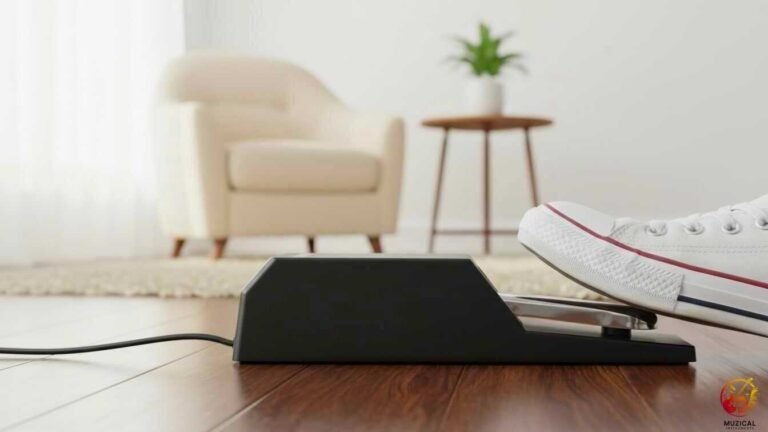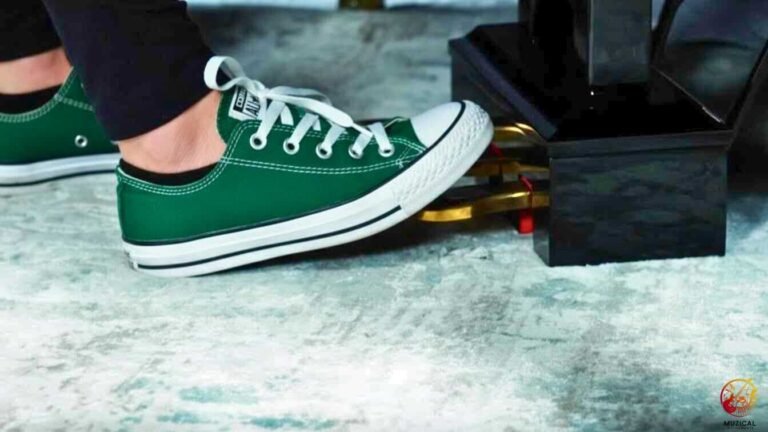Online vs In-Person Piano Lessons: Which One Is Right for You?
Online vs in-person piano lessons, each way has something special.
Online courses are convenient. You can pick your own schedule. Learn anywhere. Pause and rewind video if you need to practice more. Several apps make learning fun with games and progress meters. And you can find teachers from all over the world.
But they’re not perfect. Your internet might lag. No one is there to fix your hand shape. And staying focused is on you.
In-person lessons are different. A teacher sees your hands. They help with posture, finger moves, and body balance. You get live feedback on the spot. No lag, no setup. You just sit and play. But it can cost more. You have to travel. And you get fewer choices for teachers.
We will help you choose the one that fits you. Whether you love freedom or need structure, we’ll walk through it together. Step by step.
Quick Comparison: Online vs In-Person Piano Lessons
| Feature | Online Piano Lessons | In-Person Piano Lessons |
|---|---|---|
| Location | Anywhere (home, travel, etc.) | Music studio, teacher’s home, or your home |
| Flexibility | Very flexible – choose your time | Fixed schedule – set time each week |
| Teacher Access | Remote – through video or app | In person – teacher sits beside you |
| Feedback | May be delayed or limited | Instant – direct correction and support |
| Tools & Tech | Apps, videos, games, screen sharing | Physical books, hand guidance, visual demos |
| Focus & Motivation | Self-guided – needs discipline | Teacher helps keep you focused and on track |
| Cost | Usually lower; monthly or per class | Often higher per lesson |
| Travel Required | None | Yes – unless teacher comes to you |
| Learning Style Fit | Great for independent learners | Great for hands-on, in-person learners |
| Best For | Busy schedules, long-distance learning, tight budgets | Direct feedback, posture help, young beginners |
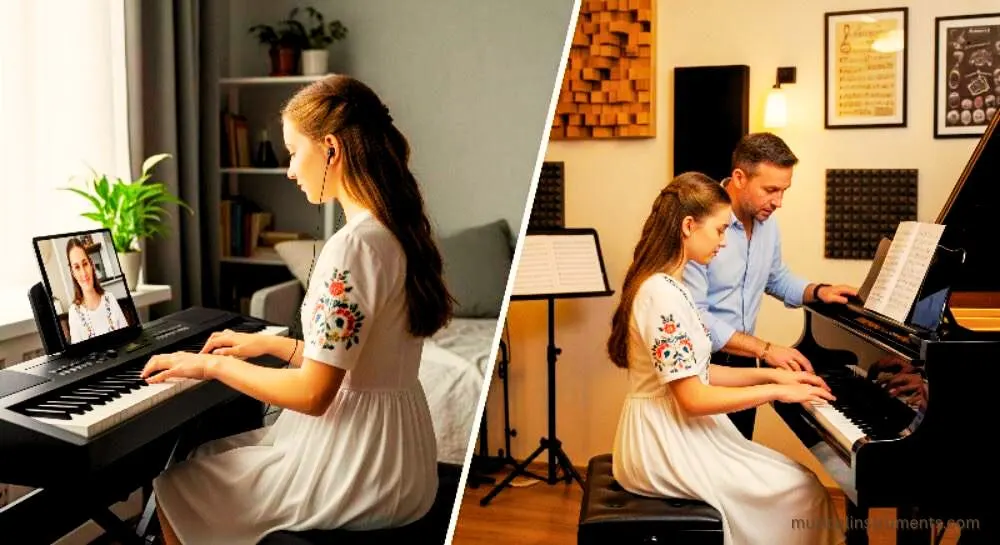
What Are Online Piano Lessons Like?
Online vs in-person piano lessons can have a very different atmosphere. Let’s try online lessons first.
Online lessons mean you don’t have to go anywhere. You stay at home. You only sit at your own piano or keyboard. Your teacher appears on your computer monitor. Sometimes the lessons are live. Sometimes they are videos you can watch any time.
You can pause, rewind, or play the video again if you miss something. Many apps also make learning fun. They give you songs to play, show notes on the screen, and track your progress with points or stars.
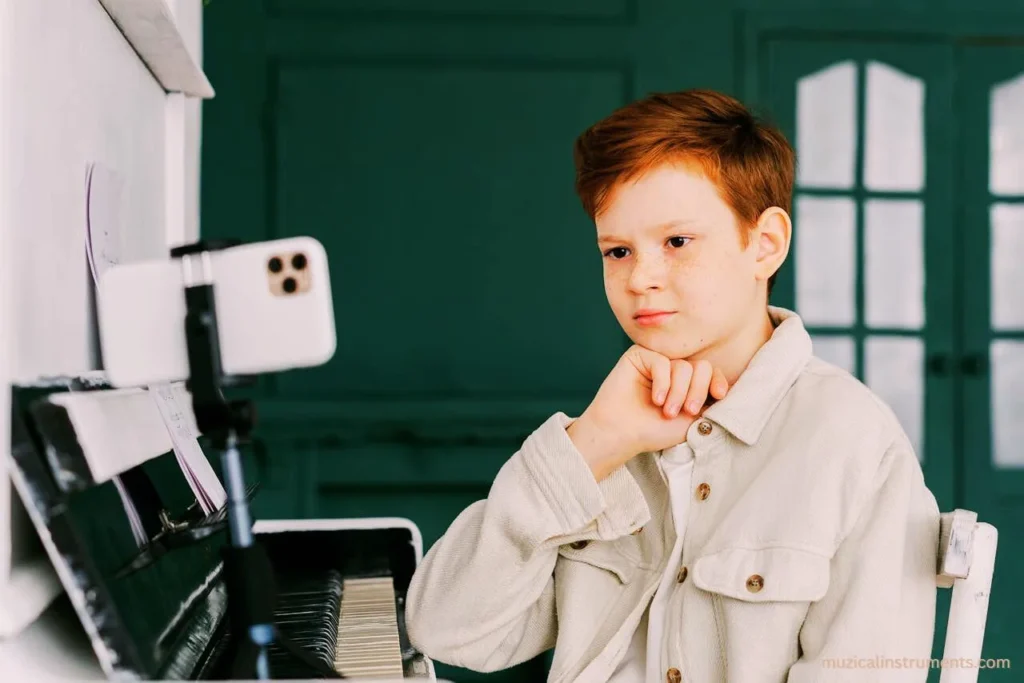
You can learn from teachers all over the world. You don’t need to live near them. Some platforms even let you choose a time that works for you, even if it’s early in the morning or late at night.
But you do need good internet. If the video freezes, it can slow you down. And no one is there to fix your hands or show you your posture. You have to be focused and keep yourself on track.
Still, online lessons are great if you want freedom, fun tools, and flexible times. They’re a smart choice for many people, especially if you learn best at your own pace.
What Happens in In-Person Piano Lessons?
In the online vs in-person piano lessons debate, many people still choose in-person and for good reason.
When you take lessons face to face, your teacher sits right beside you. They watch your hands. They fix your finger shape, wrist, and posture right away. If you press the wrong key, they’ll stop and show you what to change.
You don’t need to worry about your internet or camera. There’s no lag. No tech problems. Just you, your teacher, and the piano.
In-person lessons often help you focus better, too. The space is quiet. No phone. No game apps. Just the sound of music and a real person guiding you.
These lessons can feel more personal. Some teachers invite students to small recitals. You meet others. You build confidence. You stay motivated because someone is watching and helping each week.
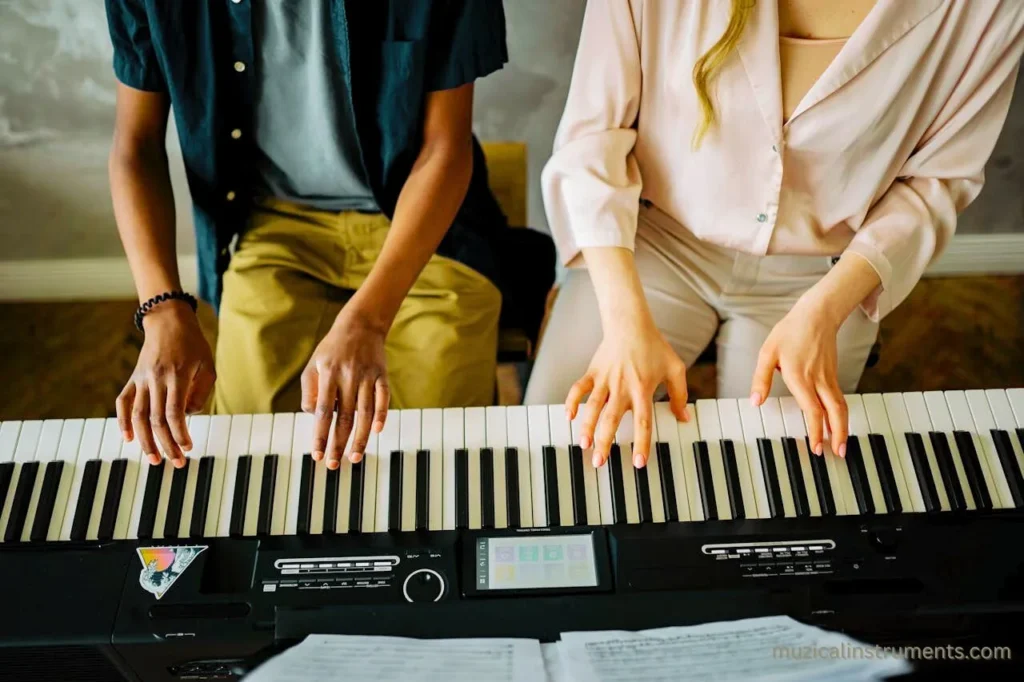
But it takes more effort. You may have to drive or take a bus. You must arrive on time. And lessons usually cost more than online ones.
Still, if you learn best by seeing, doing, and being with someone in the room, in-person piano lessons might be the best fit for you.
Why Choose Online Piano Lessons or Might Not?
When considering online versus in-person piano lessons, it is a help to consider the good and the bad of both. Let’s begin with online.
Online piano lessons provide you with freedom. You can pick your own time. You don’t have to go out the door. You can study early in the morning or late at night. You don’t have to deal with traffic, gas, or being late.
Most online lessons have fun tools. Apps transform lessons into games. You can get stars, unlock tunes, and monitor your progress. If you forget something, just pause and rewind the video.
Online lessons also cost less in many cases. Some teachers charge less for online. And you can even find full courses for one flat fee each month.
But there are downsides too. A video can’t reach over and help your hands. If your posture is off, you may not notice. If the sound lags or the video freezes, you can get confused. And if you have trouble focusing, it’s easy to slip.
You also need the right setup. That means a keyboard or piano, a camera, and a quiet space.
Still, for many people, the pros outweigh the cons. Online lessons are great if you like learning your own way, on your own time, with helpful tools to keep things fun.
Why Choose In-Person Piano Lessons or Might Not?
In the online vs in-person piano lessons conversation, some learners still feel best with a teacher right next to them.
In-person piano lessons give you something no screen can: real-time help you can feel. Your teacher can gently move your hands, fix your posture, and point out small mistakes right away. You don’t have to guess what to fix, they show you.
This kind of learning is more personal. You can ask questions and get answers immediately. You may even laugh, chat, and know your teacher. Some say it’s more real, more alive.
One-on-one lessons keep you in line. When you go in every week you can continue. Your teacher reminds you. You might even play at recitals so you can play what you have learned.
But these lessons take more time and money. You might need to travel. If your teacher is far, that adds even more time. And prices are usually higher than online classes.
Also, you may not have many teachers near you. In a small town, there might only be one or two to choose from.
Still, if you learn best by doing things with someone right there beside you, in-person piano lessons could be just what you need.
Which One Fits You Best?
Now that you know the difference between online vs in-person piano lessons, it’s time to think about your life. What works best for you?
Ask yourself a few questions.
Are you super busy? Do you need to learn at night or early morning? Online lessons might be better. You can learn anytime and anywhere. Just turn on your screen and play.
Do you need help staying focused? Do you like having someone next to you, guiding your hands and cheering you on? Then in-person lessons may be a better fit.
Do you want to learn from a teacher who lives far away? Online gives you more choices. You can find teachers from all over the world. But if you want someone right there with you, someone who can point and fix things fast, go with in-person.
Think about your space, too. Do you have a quiet spot and a good internet connection? Great, online could work well. If not, it might be easier to go to a lesson somewhere else.
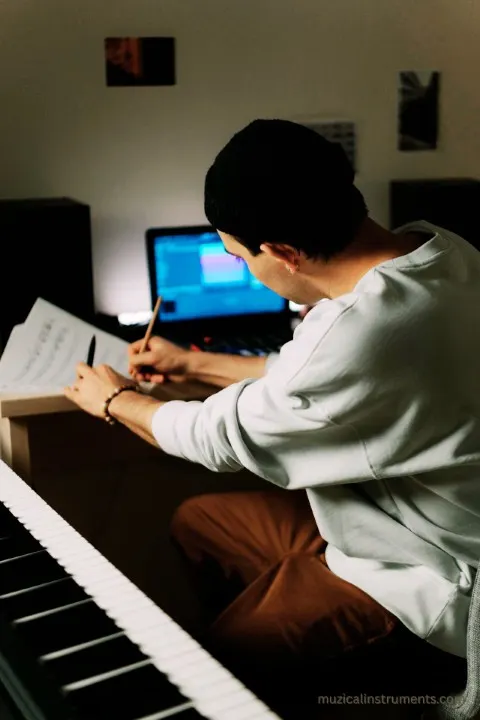
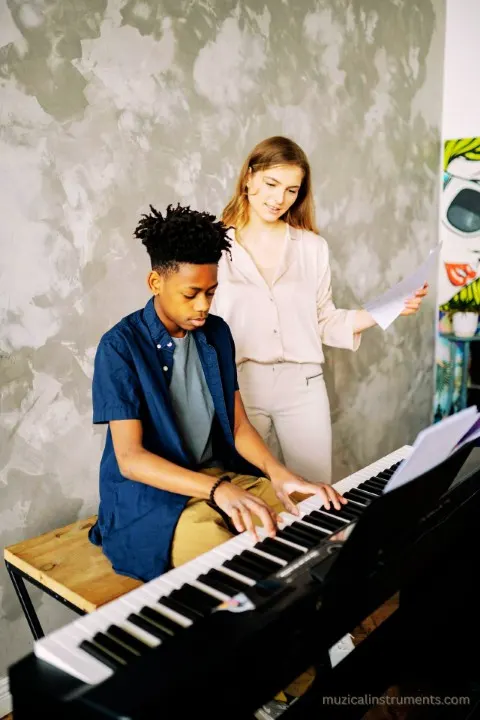
Still can’t decide? Some people try both. You might start online and switch later. Or go in person once a month and learn online the rest of the time. That’s called hybrid learning and it works great for many students.
There’s no one “right” way. The best piano lesson is the one that fits your time, your style, and your goals.
Which One Fits You Best?
Now that you know the difference between online vs in-person piano lessons, it’s time to think about your life. What works best for you?
Ask yourself a few questions.
Are you super busy? Do you need to learn at night or early morning? Online lessons might be better. You can learn anytime and anywhere. Just turn on your screen and play.
Do you need help staying focused? Do you like having someone next to you, guiding your hands and cheering you on? Then in-person lessons may be a better fit.
Do you want to learn from a teacher who lives far away? Online gives you more choices. You can find teachers from all over the world. But if you want someone right there with you, someone who can point and fix things fast, go with in-person.
Think about your space, too. Do you have a quiet spot and a good internet connection? Great, online could work well. If not, it might be easier to go to a lesson somewhere else.
Still can’t decide? Some people try both. You might start online and switch later. Or go in person once a month and learn online the rest of the time. That’s called hybrid learning and it works great for many students.
There’s no one “right” way. The best piano lesson is the one that fits your time, your style, and your goals.
What Do Piano Lessons Cost?
When you’re thinking about online vs in-person piano lessons, money matters. Some lessons cost more than others, and knowing that can help you choose.
Online lessons are usually cheaper. You might pay around $15 to $40 per lesson. Some websites charge a monthly fee instead, so you can take as many lessons as you want. Others let you watch videos anytime once you pay.
In-person lessons cost more. Many teachers charge $30 to $100 each time you meet. The price depends on where you live, how skilled the teacher is, and how long the lesson lasts.
But there’s more to think about than just the lesson fee.
With online piano lessons, you might need a few extras: a webcam, a quiet space, a stand for your phone or laptop, and a good internet connection. Some people also pay for learning apps.
For in-person lessons, you may need to drive or take a bus. That means spending time and gas money. You might also buy printed books or pay for recital clothes.
Both types of lessons have costs. One isn’t always better than the other. It depends on your budget, your time, and what kind of learning feels best to you.
Cost Comparison Chart: Online vs In-Person Piano Lessons
| Cost Factor | Online Piano Lessons | In-Person Piano Lessons |
|---|---|---|
| Average Per Lesson | $15 – $40 | $30 – $100 |
| Monthly Subscription | $10 – $30 (unlimited lessons) | Not common |
| Travel Costs | $0 | Varies (fuel, transport, parking) |
| Equipment Needed | Piano/keyboard, webcam, internet | Piano/keyboard |
| Extra Materials | Often included (PDFs, apps) | Sheet music/books often separate |
| Setup Costs | May need mic stand, camera mount | Usually no extra setup needed |
| Missed Lesson Fees | Usually flexible or pre-recorded | Often charged or lesson lost |
| Recital/Exam Fees | Optional or low-cost online recitals | May include formal recital/exam fees |
| Teacher Availability | More choices, often lower rates | Local only, can be higher rates |
| Long-Term Cost Trend | Lower overall with self-discipline | Higher, but includes guided progress |
Still Can’t Decide? Try Both
If you still feel unsure about online vs in-person piano lessons, here’s some good news: you don’t have to choose just one forever.
Many students try both. You can start with online lessons to see if you like learning at home. If that feels lonely or tricky, you can switch to in-person. Or you can do the opposite, start with a local teacher, then move online when life gets busy.
Some teachers even offer a mix. You might go to class once a month and take online lessons in between. That’s called blended or hybrid learning. It gives you the best of both worlds, real help from a teacher plus the freedom to learn at your pace.
Trying both helps you see what works best for you. You may find that one style helps you stay focused or learn faster. Or you may like switching between them to keep things fresh.
There’s no rule that says you must pick only one way. The goal is to keep learning, keep playing, and enjoy the music you make.
Final Thoughts: Choosing What’s Right for You
So, when it comes to online vs in-person piano lessons, there’s no one-size-fits-all answer. Both ways can help you learn and grow. The best choice is the one that fits your life, your schedule, and how you learn best.
If you need freedom, low cost, and want to learn from anywhere, online lessons may be perfect. If you want a teacher by your side to guide your hands and cheer you on, in-person may be better.
You can also mix both. Start with one. Try the other. See what feels right.
Learning piano should be fun, not stressful. Whether you’re playing at home in pajamas or sitting on a bench next to a teacher, what matters most is that you keep going. Keep practicing. Keep playing.
The music you want is waiting. Now you just get to choose the path to get there.
If you’re taking lessons at home, a spinet piano for small home practice might be a smart and space-saving choice.
FAQ: Online vs In-Person Piano Lessons
1. Online vs In-Person Piano Lessons: What’s better for beginners?
If you’re just starting, both can work! In-person piano lessons give you direct help from a teacher. Online piano lessons give you freedom to learn anytime. Pick what feels right for you and your schedule.
2. Are online piano lessons effective?
Yes, online piano lessons work well! Many students learn at home using videos, apps, and online teachers. You just need a piano or keyboard and a quiet place to practice.
3. Do online piano lessons cost less?
Most of the time, yes. Online piano lessons are usually cheaper than in-person ones. Some even offer monthly subscriptions that let you learn as much as you want.
4. Can I switch from in-person to online piano lessons?
Absolutely. Many students start with in-person lessons and later switch to online piano lessons when life gets busy or they want more flexibility.
5. Do I need fast internet for online piano lessons?
A good internet connection helps, especially for video calls. But if you’re using recorded videos or apps, even average internet works fine.
6. Which is better for kids in the context of Online vs In-Person Piano Lessons?
In-person piano lessons are great for younger kids who need more hands-on help. Online piano lessons work better for older kids who can follow instructions on their own.

